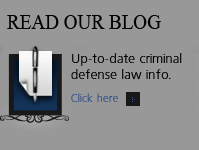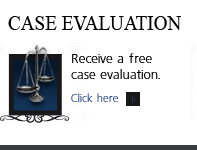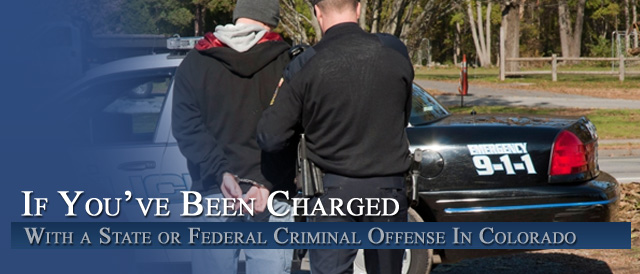

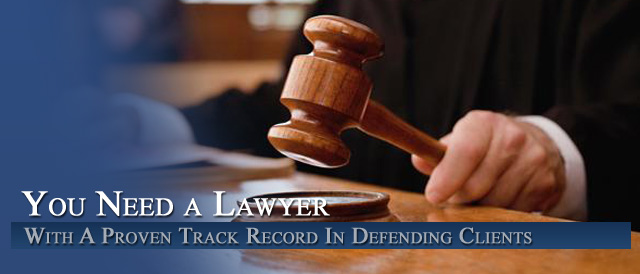
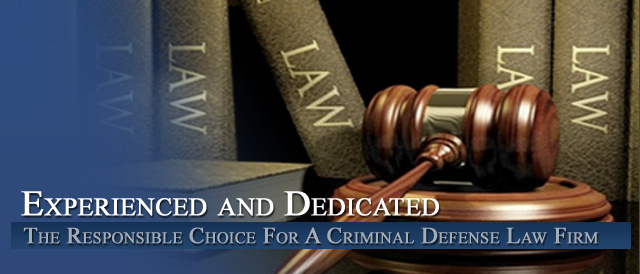
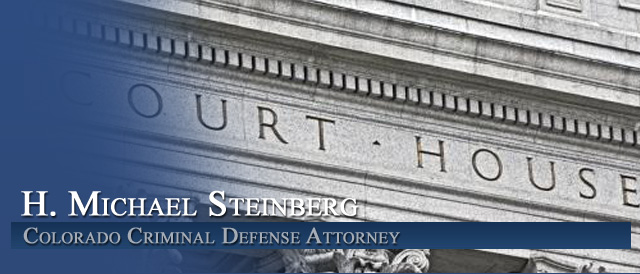
Denver Colorado Child Abuse Lawyer Writes About Fighting The Unfair Use of Experts On The Issue Of Non-Accidental Trauma – 18–6–401
By H. Michael Steinberg Colorado Criminal Defense Lawyer – Child Abuse Cases – Email the Author at [email protected]
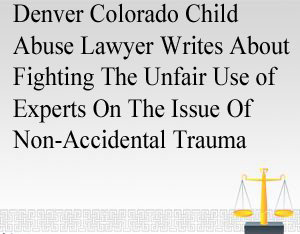 Denver Colorado Child Abuse Lawyer Writes About Fighting The Unfair Use of Experts On The Issue Of Non-Accidental Trauma – 18-6-401 – This topic explores use of experts by the prosecution to prove the charge of felony child abuse (18–6–401).
Denver Colorado Child Abuse Lawyer Writes About Fighting The Unfair Use of Experts On The Issue Of Non-Accidental Trauma – 18-6-401 – This topic explores use of experts by the prosecution to prove the charge of felony child abuse (18–6–401).
As In The Defense Of ALL Colorado Criminal Cases – You Must Start With The Law – What Must The Prosecution Prove At Trial?
Colorado Child Abuse Laws – CRS 18–6–401(1)(a) and (7)(a)(III)
(1)(a) A person commits child abuse if such person causes an injury to a child’s life or health, or permits a child to be unreasonably placed in a situation that poses a threat of injury to the child’s life or health, or engages in a continued pattern of conduct that results in malnourishment, lack of proper medical care, cruel punishment, mistreatment, or an accumulation of injuries that ultimately results in the death of a child or serious bodily injury to a child.
…
(7)(a)(III) When a person acts knowingly or recklessly and the child abuse results in serious bodily injury to the child, it is a class 3 felony. ( Colorado Criminal Sentencing Laws Maximum Sentence – 4 years to 16 years in the Department of Corrections
First – Is There Sufficient Evidence For A Conviction Of Child Abuse?
Colorado felony child abuse resulting in serious bodily injury. § 18–6–401(1)(a).
Here are the basic elements of felony child abuse SBI – broken down:
1. That the defendant,
2. in the State of Colorado, at or about the date and place charged,
3. knowingly or recklessly,
4. caused an injury to the child’s life or health.
The Mental State – (Mens Rea) – of The Offense
The culpable mental state that is applied in child abuse cases relates to the nature of a defendant’s conduct in relation to the child or to the circumstances under which the act occurred, and not to a specific result.
Knowing Conduct
Knowing conduct in child abuse cases means “an awareness of the abusive nature of the defendant’s conduct in relation to the child, or awareness of the circumstances in which the defendant commits an act against the well-being of the child.
Reckless Conduct
Reckless conduct means that the defendant consciously disregarded a substantial and unjustifiable risk that, in the light of the child’s circumstances, – the act or omission placed the child in a situation which posed a threat of injury.
Most Cases Turn On Circumstantial evidence
The kinds of circumstantial evidence a jury may rely on to prove the defendant’s state of mind include the following examples:
-
- the serious nature of the injuries;
- the defendant’s admissions;
- the failure to seek medical care;
- indications of prior injuries that suggest repeated abuse;
- the brutality of the attack;
- the disparity in size and strength of the defendant and the victim;
- the defendant’s lack of remorse and efforts to avoid detection;
- the concealment of the injuries
- and motive to hurt the child
The Dangerous Use Of Experts To “Prove” Felony Child Abuse In Colorado
In many serious alleged child abuse cases – their exists injuries which are identified by physicians as “ non-accidental trauma.” Non-accidental trauma means that the child’s injuries were caused either by an intentional act, a knowing act, or a reckless act and were NOT the result of an accident.
Example – An infant child is rushed to the ER by the child’s parents. They tell the attending physicians that the infant’s injuries were caused by having fallen off their bed and they try their best to describe what happened to the child. The doctors meet – and many times a “Child Protection Team” (CPT) is called in. The team makes a finding that this is “non-accidental trauma.”
There are no witnesses to the injury, there is no other explanation of the injury, and there are no statements from the parents that support this diagnosis. They still make the MEDICAL finding of child abuse.
What does this mean in a criminal court of law?
A Parent Is Arrested For Child Abuse Resulting In Serious Bodily Injury (SBI)
At trial – the prosecutor – district attorney (DA) has no direct or even strong circumstantial evidence of the mechanism of injury. The DA is left with retaining – at state expense – an “expert” who will testify that because of the severity and nature of the child’s injuries – the injuries could not have been non-accidental and could not have been caused by the explanation given by the parents – “a fall off a bed.”
People v. Rector – The Colorado Supreme Court Puts Limits On The DA’s Use Of Expert Testimony
In an important decision by the Colorado Supreme Court in 2011 – People v Rector – 2011 Colorado Supreme Court – Child Abuse – a well known Colorado expert in child abuse was called to testify as a witness in just such a child abuse case.
In the Rector case, Dr. Andrew Sirotnak testified that, in his opinion, “within a reasonable [degree of] certainty,” the child’s injuries (in this case) were “the result of [child] abuse.”
What happened in that case provided a very useful pattern of attack on preventing the unfair use of this destructive and unfair testimony which so influences a jury that a fair trial sometimes seems to become impossible.
Stopping The People’s Experts From Speculating As To The Legal Cause of Suspected Child Abuse
In the Rector case – the expert was allowed to testify that he reached his conclusion based upon the inference that since he was unaware of any adequate explanation for the severity of the child’s traumatic injuries.
Dr. Andrew Sirotnak, testified that the presence of a severe traumatic injury and no history of trauma to explain that injury indicates that, from a medical perspective, there was child physical abuse or it is highly suspected there was child physical abuse.
Rector was convicted and was sentenced her to fifteen years in the Department of Corrections, plus five years of mandatory parole. He appealed the decision and won his appeal.
A Closer Look At Expert Testimony In Colorado Child Abuse Cases
The use of expert testimony in Colorado Child Abuse cases requires that atrial court admit expert testimony ONLY AFTER it makes clear findings under established cases that are based on what is called in the law – A Shreck hearing. This hearing or finding determines the true reliability and possible prejudicial effect of this testimony under the Colorado Rules Of Evidence -CRE 702 and 403.
The Shreck Demand
Before a Colorado Court may allows the admission of expert testimony at trial – the trial court to make specific findings regarding the admissibility of this testimony pursuant to the Colorado Rules of Evidence 403 and 702 under People v. Schreck, 22 P .3d 68 (Colo. 2001).
The Judge must make findings that indicate:
(a) the reliability of the scientific principles relied upon;
(b) the qualifications of the witness;
(c) the usefulness of the testimony to the jury.
Put differently – the Judge must make findings on three things:
First – that the expert testimony is based upon reasonably reliable scientific principles;
Second – that the expert is qualified to opine on such matters; and
Third – that (3) the expert testimony is helpful to the jury.
The Court’s inquiry in support of these findings must be broad in nature, and must consider the “totality of the circumstances of each specific case.”
The Judge must also make findings about the admissibility of expert testimony pursuant under the rule of evidence known as C.R.E. 403:
Specifically – the Judge must find whether or not the probative value of the evidence is substantially outweighed by it’s prejudicial effect.
It Is Within This Framework That The Rector Case Makes Important Law In Colorado – Medical Child Abuse vs. Legal Child Abuse
The Rector Court found in the 2011 case – that a jury must be told that there are different definitions for what the court called “medical” and “legal” child abuse.
If a scientific principle is well established and relied upon in the field of medicine -(it was Shaken Baby Syndrome in the Rector case) – the Judge may be allowed to make an immediate finding that the first prong of the Shreck case has been met.
BUT – the analysis does not stop there. A Judge must ALSO make specific findings to determine the reliability of the expert’s anticipated testimony in the very case at trial – that is – as charged – the child’s injuries were caused by either an intentional act of abuse, a knowing act of child abuse, a reckless act of child abuse -or a negligent act of child abuse. AND the judge must determine – if it gets that far- that the probative value of the testimony was not substantially outweighed by the danger of unfair prejudice.
Summary So Far…
A trial Judge must make specific findings to determine whether the expert testimony was
1. reliable under CRE 702 (Shreck Prong 1)
2. not unfairly prejudicial under CRE 403. (Shreck Prong 2), and
3. the testimony is helpful to the jury (Shreck Prong 3)
The Rector Court Finds The Trial Judge Failed In It’s Duty
In Rector – the Court held that:
- “We agree that the trial court abused its discretion in admitting the expert testimony without making an adequate inquiry and specific findings.”
- Reliability is determined by the trial court based on the totality of circumstances, considering the reasonable reliability of the scientific principles underlying the testimony.
- Reliability requires an expert opinion be based on reliable principles and methods as opposed to subjective belief or unsupported speculation);
- A party must show that the method used by the expert to reach a conclusion is scientifically sound and that the opinion is based on facts which satisfy reliability requirements of CRE 702.
An expert may use a process of elimination as a reliable scientific method to reach a conclusion but this is a medical conclusion – NOT a legal finding…
How Far Can An Expert Go?
While the law allows an expert to give an opinion on what the jury must ultimately find in a jury trial “an ultimate issue of fact,” (CRE 704) an expert can NOT go so far as to “usurp the function of the court by expressing an opinion on the applicable law or legal standards.”
In Rector – the expert was allowed to testify that a subdural hematoma (the injury in the case) – is rarely, if ever, caused by a minor household fall and that it was highly probable that physical abuse explained the severity of the child’s injuries, because there was no other adequate explanation. He testified that the child’s injuries were reasonably certain to have been the result of child abuse.
The Judge In Rector Failed To Apply The Correct Law To The Experts Opinion That This Was Child Abuse
The ruling is important. The Rector Court said that the Judge presiding over the trial – abused his discretion and committed error in:
(1) not adequately inquiring and in not making specific findings whether the expert’s conclusion that the child’s injuries resulted from child abuse was based on reliable scientific principles, and,
(2) by admitting this evidence without making findings under CRE 403 (the probative vs the prejudicial effect of the evidence) and also by not instructing the jury on the different definitions of medical and legal child abuse. – and that,
(3) the expert’s opinion regarding the ultimate legal issue of whether this injury was in fact child abuse – usurped (took away) the jury’s role as the fact finders of what happened. The jury verdict was reversed!
The Issue In Every Colorado Child Abuse Case Is – Was This CHILD ABUSE?
The use of child abuse experts in a trial where the facts and evidence are at best confusing and contradictory can make the difference between acquittal and conviction…. the destruction of lives or the restoration of freedom.
An expert’s opinion on whether injuries constitute child abuse – turns on a medical diagnosis – not a legal diagnosis. A Judge must instruct the jury on the different definitions of medical and legal child abuse or the jury will confuse the two concepts with devastating results.
A trial judge – in a Colorado child abuse case – if expert medical testimony is offered MUST make findings as to whether a medical expert’s conclusions that a child’s injuries resulted from child abuse are based on reliable scientific principles, that the doctor is qualified as an expert in the field of child abuse also must explicitly rule concerning the admissibility of expert testimony concerning a diagnosis of child abuse under CRE 403, and the Shreck case by DIFFERENTIATING between medical and legal child abuse.
An expert may testify – having passed this scrutiny – that a child’s injuries are “consistent with” medical child abuse, but CANNOT TESTIFY that the accused defendant is therefore guilty of felony child abuse. A medical diagnosis of child abuse differs from the legal elements of the Colorado criminal offense of child abuse. (See the definition of child abuse in the Children’s Code, section 19–1–103(1)(a), C.R.S.)
Medical child abuse is much narrower than the elements of felony child abuse. Colorado criminal law requires a specific finding by the jury that the person charged acted intentionally, knowingly, recklessly or with criminal negligence.
Thus, on remand, even if the trial court determines that expert testimony regarding injuries caused by medical child abuse is scientifically reliable, it must make findings on the issue of unfair prejudice under CRE 403 and, if it determines the evidence is admissible, it must instruct the jury on the different definitions of medical and legal child abuse.
The Analysis – Question Asked In A Colorado Child Abuse Case?
- Are there multiple explanations for the injury?
- Are they conflicting?
- Or are they consistent?
- How did the suspect appear when first interviewed by law enforcement?
There is much more to the analysis – space limits the length of this article….
Denver Colorado Child Abuse Lawyer Writes About Fighting The Unfair Use of Experts On The Issue Of Non-Accidental Trauma – 18–6–401
ABOUT THE AUTHOR: H. Michael Steinberg – Email The Author – A Denver Colorado Criminal Defense Lawyer – or call his office at 303-627-7777 during business hours – or call his cell if you cannot wait and need his immediate assistance – 720-220-2277.
If you are charged with A Colorado crime or you have questions about the topic of this article – Denver Colorado Child Abuse Lawyer Writes About Fighting The Unfair Use of Experts On The Issue Of Non-Accidental Trauma – 18–6–401- please call our office. The Law Offices of H. Michael Steinberg, in Denver, Colorado, provide criminal defense clients with effective, efficient, intelligent and strong legal advocacy. We can educate you and help you navigate the stressful and complex legal process related to your criminal defense issue.
 H. Michael Steinberg, is a Denver, Colorado criminal defense lawyer with over 40 years of day to day courtroom experience – specializing in Colorado Criminal Law along the Front Range. He will provide you with a free initial case consultation to evaluate your legal issues and to answer your questions with an honest assessment of your options. Remember, it costs NOTHING to discuss your case. Call now for an immediate free phone consultation.
H. Michael Steinberg, is a Denver, Colorado criminal defense lawyer with over 40 years of day to day courtroom experience – specializing in Colorado Criminal Law along the Front Range. He will provide you with a free initial case consultation to evaluate your legal issues and to answer your questions with an honest assessment of your options. Remember, it costs NOTHING to discuss your case. Call now for an immediate free phone consultation.
Helping Clients To Make Informed Decisions In the Defense of Colorado Criminal Cases.
Contact A Lawyer with Three Decades of Experience as a Denver Criminal Attorney at The Steinberg Colorado Criminal Defense Law Firm today.
Colorado Defense Lawyer H. Michael Steinberg provides solid criminal defense for clients throughout the Front Range of Colorado – including the City and County courts of Adams County, Arapahoe County, City and County of Boulder, City and County of Broomfield, City and County of Denver, Douglas County, El Paso County – Colorado Springs, Gilpin County, Jefferson County, Larimer County, and Weld County,…. and all the other cities and counties of Colorado along the I-25 Corridor… on cases involving the topic of – Denver Colorado Child Abuse Lawyer Writes About Fighting The Unfair Use of Experts On The Issue Of Non-Accidental Trauma – 18–6–401.
Other Articles of Interest:
- Unfair Tactics
- Shaken Baby Syndrome and Colorado Non Accidental Trauma – Child Abuse – Denver Colorado Criminal Defense Lawyer – H. Michael Steinberg
- Colorado Criminal Law: Parental Use of Drugs as Child Abuse
- When Experts Testify
- Running Away – Evidence Of Flight In Colorado Criminal Cases – What Does It Mean?

